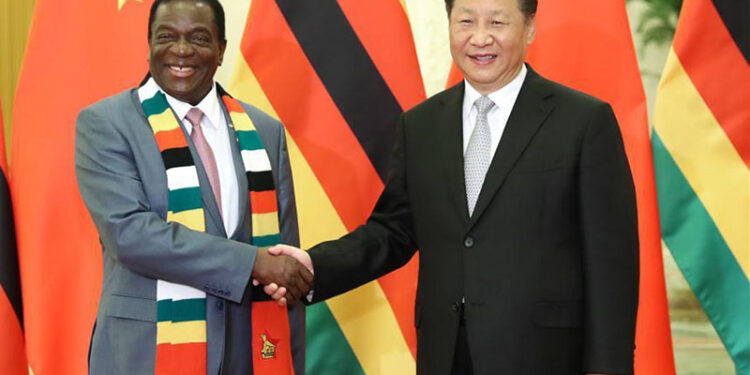China has let go of an undisclosed sum of Zimbabwe’s interest-free loans and committed to assisting the nation in overcoming its ongoing debt crisis. However, activists from Zimbabwe caution against falling into a perpetual cycle of indebtedness.
The East African reported that Zimbabwe’s debt reached $17.7 billion in September 2023, with $12.7 billion being external debt and $5 billion domestic debt.
The majority of the foreign debt was acquired from China, as Zimbabwe is presently unable to obtain loans from international financial institutions like the International Monetary Fund (IMF) and the World Bank due to payment defaults.
Following the departure of the nation’s longstanding leader, Robert Mugabe, six years ago, Zimbabwe has faced challenges in negotiating with creditors to address its unmanageable debt.
China, currently Zimbabwe’s primary creditor beyond Western nations, has expressed its dedication to assisting Zimbabwe in overcoming its financial difficulties.
- China attaches great importance to resolving Zimbabwe’s debt issues,” said China’s ambassador to Zimbabwe, Zhou Ding.
- “China would like to enhance communication with the Zimbabwe government to work out proper statements through friendly consultation. As a concrete measure, China has canceled Zimbabwe’s interest-free loans, which matured by the end of 2015.” Zhou added.
The Chinese official refrained from revealing the specific figure of loans forgiven by the Chinese government, however, analysts speculate that the amount is relatively low due to Zimbabwe’s rise in Chinese debts for infrastructure ventures towards the conclusion of President Mugabe’s almost forty-year tenure.
President Mnangagwa’s administration has persistently sought loans from China, yet Mr. Zhou dismissed claims that Zimbabwe is currently ensnared in a debt crisis as a result of the substantial Chinese borrowings.
The West has expressed disapproval towards the Chinese government for providing loans to nations that are unable to repay, resulting in an expanding roster of African countries relying on Chinese funding as a means to counterbalance US influence in the region.
READ MORE: Will US SEC Investigate OpenAI CEO Altman And Microsoft’s Nadella?
China strongly refutes these allegations, asserting that its interactions with African nations are founded on the principle of non-interference in the internal affairs of other countries.
In 2022, the Zimbabwean government disclosed that it had secured a $200 million loan from China, backed by 26 million ounces of platinum reserves.
Additionally, Zimbabwe obtained substantial funding from China to enhance two key international airports and to expand its primary thermal and hydroelectric power stations.
The Zimbabwe Coalition on Debt and Development (ZIMCODD) has raised the alarm on the rising Chinese debts secured by the Zimbabwean government, citing a possible debt trap that could have the southern African country servicing debts instead of serving its people.
Military Coup
Zimbabwe’s founding leader was replaced by President Emmerson Mnangagwa following a military coup in 2017.
President Mnangagwa’s government has continued to borrow heavily from China, but Mr Zhou said it was not true that Zimbabwe was now in a death trap because of excessive Chinese loans.
“According to the data released by the Zimbabwean government, Zimbabwe’s debt owed to Western countries and international financial institutions accounts for 70 percent of its external debt, while the debt owed to China only accounts for 15 percent,” he said.
Political Leverage
China has been criticized for intentionally providing loans to countries that it knows will not be able to repay, to gain political influence and counter the United States’ presence in Africa.
China strongly denies these allegations and asserts that its relationships with African nations are founded on its policy of non-interference in the internal affairs of other countries.
According to the Zimbabwe Coalition on Debt and Development (Zimcodd), in their most recent analysis of debt, Zimbabwe is burdened with a significant amount of debt due to loan defaults during the era of Mr. Mugabe and the country’s ongoing economic challenges.
“The debt default of the early 200s, coupled with a shrinking economy, has attracted prohibitive penalties and subdued the capacity to service debts, thus trapping Zimbabwe in a debt overhang position,” Zimcodd said.
“Also due to these high debt arrears, access to concessionary loan finance has been blocked.
“As such, predatory creditors are taking advantage of Zimbabwe’s debt crisis by fuelling debt expansion –mortgaging natural resources and mineral revenues.”
What To Know
- In August 2022, China announced that it would provide 23 interest-free loans to 17 unnamed African countries, a move analysts said at the time was designed to counter accusations that Beijing was engaging in “debt-trap diplomacy”
- Rough estimates by experts put Zimbabwe’s debt to China at $3 Billion
- Meanwhile, Zimbabwe also secured a $400 million loan from Afreximbank for budget support and financing of trade-related infrastructure, which it will repay by using 38 percent of the export earnings of the country’s largest platinum miner.










